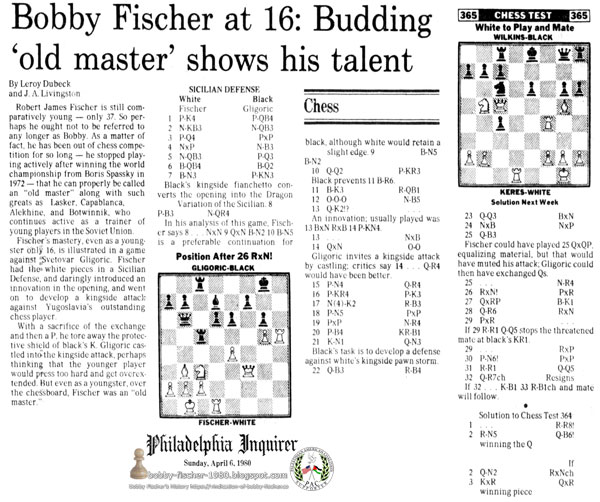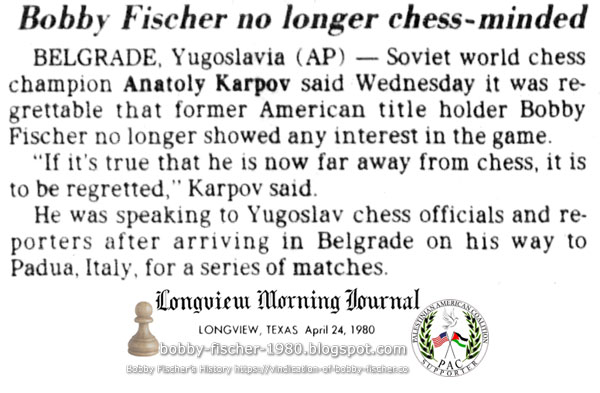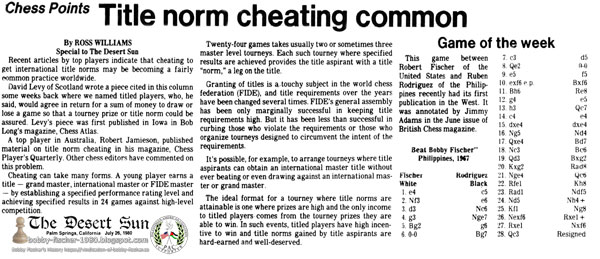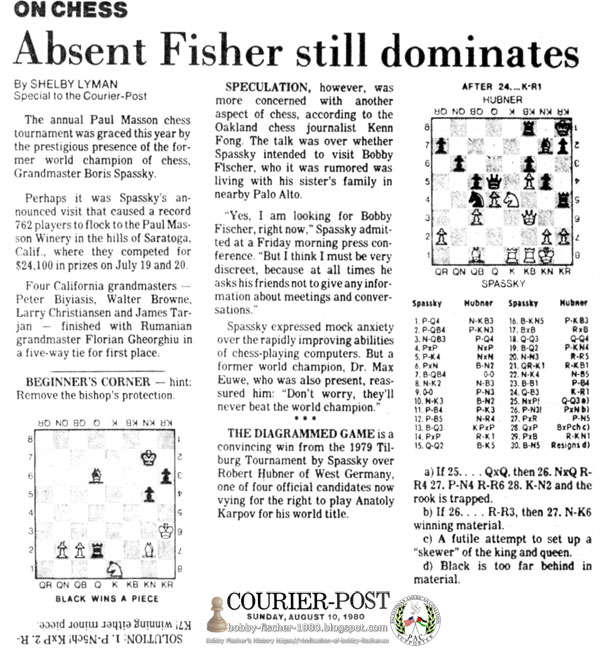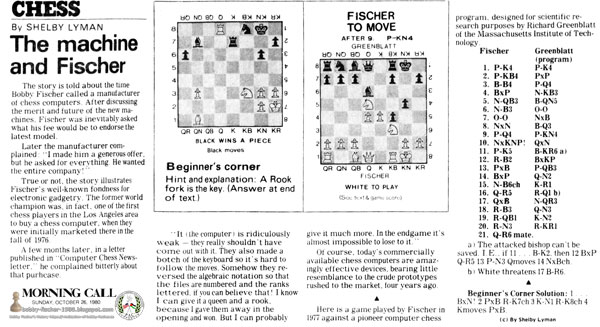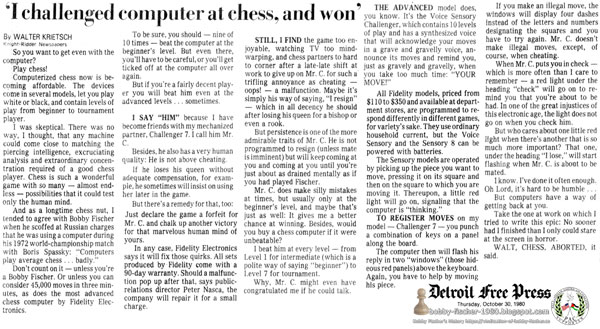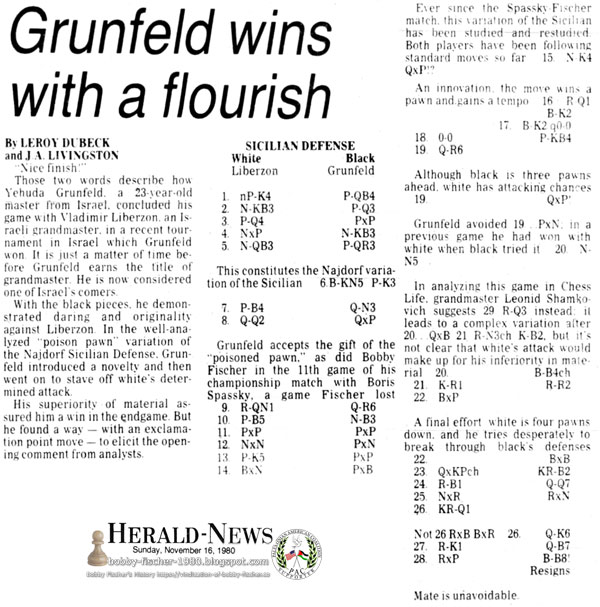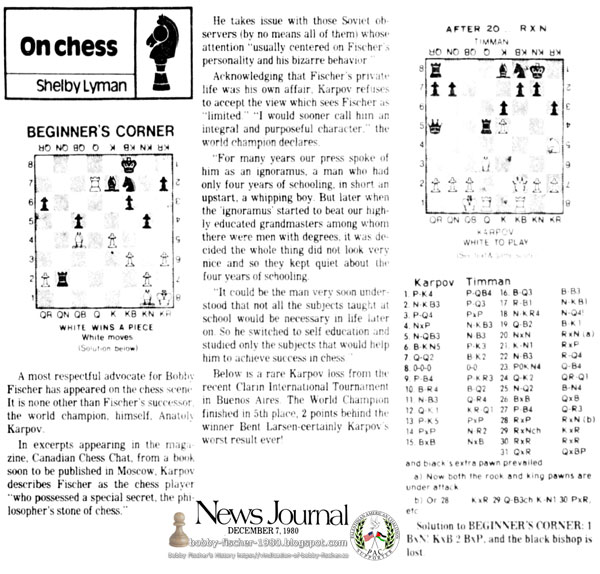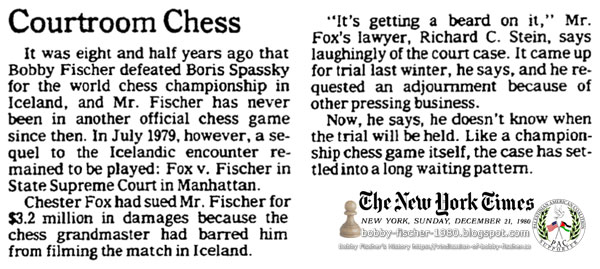The Philadelphia Inquirer Philadelphia, Pennsylvania Sunday, April 06, 1980 - Page 93
Bobby Fischer at 16: Budding 'Old Master' Shows His Talent.
By Leroy Dubeck and J.A. Livingston
Robert James Fischer is still comparatively young — only 37. So perhaps he ought not to be referred to any longer as Bobby. As a matter of fact, he has been out of chess competition for so long — he stopped playing actively after winning the world championship from Boris Spassky in 1972 — that he can properly be called an “old master” along with such greats as Lasker, Capablanca, Alekhine, and Botwinnik, who continues active as a trainer of young players in the Soviet Union.
Fischer's mastery, even as a youngster only 16, is illustrated in a game against Svetozar Gligoric. Fischer had the white pieces in a Sicilian Defense, and daringly introduced an innovation in the opening, and went on to develop a kingside attack against Yugoslavia's outstanding chess player.
With a sacrifice of the exchange and then a P, he tore away the protective shield of black's K. Gligoric castled into the kingside attack, perhaps thinking that the younger player would press too hard and get overextended. But even as a youngster, over the chessboard, Fischer was an “old master.”
Longview News-Journal, Longview, Texas, Thursday, April 24, 1980 - Page 50
Bobby Fischer No Longer Chess-Minded
Belgrade, Yugoslavia (AP) — Soviet world chess champion Anatoly Karpov said Wednesday it was regrettable that former American title holder Bobby Fischer no longer showed any interest in the game.
“If it's true that he is now far away from chess, it is to be regretted,” Karpov said.
He was speaking to Yugoslav chess officials and reporters after arriving in Belgrade on his way to Padua, Italy, for a series of matches.
The Desert Sun Palm Springs, California Saturday, July 26, 1980 - Page 18
Title Norm Cheating Common
Recent articles by top players indicate that cheating to get international title norms may be becoming a fairly common practice worldwide.
David Levy of Scotland wrote a piece cited in this column some weeks back where we named titled players, who, he said, would agree in return for a sum of money to draw or lose a game so that a tourney prize or title norm could be assured. Levy's piece was first published in Iowa in Bob Long's magazine, Chess Atlas.
A top player in Australia, Robert Jamieson, published material on title norm cheating in his magazine, Chess Player's Quarterly. Other chess editors have commented on this problem.
Cheating can take many forms. A young player earns a title — grand master, international master or FIDE master — by establishing a specified performance rating level and achieving specified results in 24 games against high-level competition.
Twenty-four games takes usually two or sometimes three master level tourneys. Each such tourney where specified results are achieved provides the title aspirant with a title “norm,” a leg on the title.
Granting of titles is a touchy subject in the world chess federation (FIDE), and title requirements over the years have been changed several times. FIDE's general assembly has been only marginally successful in keeping title requirements high. But it has been less than successful in curbing those who violate the requirements or those who organize tourneys designed to circumvent the intent of the requirements.
It's possible, for example, to arrange tourneys where title aspirants can obtain an international master title without ever beating or even drawing against an international master or grand master.
The ideal format for a tourney where title norms are attainable is one where prizes are high and the only income to title players comes from the tourney prizes they are able to win. In such events, titled players have high incentives to win and title norms gained by title aspirants are hard-earned and well-deserved.
Game of the Week
This game between Robert Fischer of the United States and Ruben Rodriquez of the Philippines recently had its first publication in the West. It was annotated by Jimmy Adams in the June issue of British Chess magazine.
Courier-Post Camden, New Jersey Sunday, August 10, 1980 - Page 44
Absent Fischer Still Dominates
The annual Paul Masson chess tournament was graced this year by the prestigious presence of the former world champion of chess, Grandmaster Boris Spassky.
Perhaps it was Spassky's announced visit that caused a record 762 players to flock to the Paul Mason Winery in the hills of Saratoga, Calif., where they competed for $24,000 in prizes on July 19 and 20.
Four California grandmasters, Peter Biyiasis, Walter Browne, Larry Christiansen and James Tarjan — finished with Rumanian grandmaster Florian Gheorghiu in a five-way tie for first place.
SPECULATION, however, was more concerned with another aspect of chess, according to the Oakland chess journalist Kenn Fong. The talk was over whether Spassky intended to visit Bobby Fischer, who it is rumored was living with his sister's family in nearby Palo Alto.
“Yes, I am looking for Bobby Fischer, right now,” Spassky admitted at a Friday morning press conference. “But I think I must be very discreet, because at all times he asks his friends not to give any information about meetings and conversations.”
Spassky expressed mock anxiety over the rapidly improving abilities of chess-playing computers. But a former world champion, Dr. Max Euwe, who was also present, reassured him; “Don't worry, they'll never beat the world champion.”
THE DIAGRAMMED GAME is a convincing win from the 1979 Tilburg Tournament by Spassky over Robert Hubner of West Germany, one of four official candidates now vying for the right to play Anatoly Karpov for his world title.
The Morning Call Allentown, Pennsylvania Sunday, October 26, 1980 - Page 111
Chess: The Machine and Fischer
“…illustrates Fischer's well known fondness for electronic gadgetry. The former world champion was, in fact, one of the first chess players in the Los Angeles area to buy a chess computer, when they were initially marketed there in the fall of 1976.
A few months later, in a letter published in “Computer Chess Newsletter,” he complained bitterly about that purchase.
“It (the computer) is ridiculously weak — they really shouldn't have come out with it. They also made a botch of the keyboard so it's hard to follow the moves. Somehow they reversed the algebraic notation so that the files are numbered and the ranks lettered, if you can believed that! I know I can give it a queen and a rook, because I gave them away in the opening and won. But I can probably give it much more. In the endgame it's almost impossible to lose to it.”
Of course, today's commercially available chess computers are amazingly effective devices, bearing little resemblance to the crude prototypes rushed to the market, four years ago.
…
Here is a game played by Fischer in 1977 against a pioneer computer chess program, designed for scientific research purposes by Richard Greenblatt of the Massachusetts Institution of Technology.
Detroit Free Press Detroit, Michigan Thursday, October 30, 1980 - Page 55
I Challenged Computer at Chess, and Won
“And as a long time chess nut, I tended to agree with Bobby Fischer when he scoffed at Russian charges that he was using a computer during his 1972 world-championship match with Boris Spassky: “Computers play average chess…badly.”.
Don't count on it — unless you're a Bobby Fischer. Or unless you can consider 45,000 moves in three minutes, as does the most advanced chess computer by Fidelity Electronics.
The Herald-News Passaic, New Jersey Sunday, November 16, 1980 - Page 23
Grunfeld Wins With A Flourish
“…Ever since the Spassky-Fischer match, this variation of the Sicilian has been studied and restudied. Both players have been following standard moves so far…”
News-Journal Mansfield, Ohio Sunday, December 07, 1980 - Page 63
The Philosopher's Stone of Chess
“…In excerpts appearing in the magazine, Canadian Chess Chat, from a book soon to be published in Moscow, Karpov describes Fischer as the chess player “who possessed a special secret, the philosopher's stone of chess.”
He takes issue with those Soviet observers (by no means all of them) whose attention “usually centered on Fischer's personality and his bizarre behavior.”
Acknowledging that Fischer's private life was his own affair, Karpov refuses to accept the view which sees Fischer as “limited.” “I would sooner call him an integral and purposeful character,” the world champion declares.
“For many years our press spoke of him as an ignoramus, a man who had only four years of schooling, in short an upstart, a whipping boy. But later when the ‘ignoramus’ started to beat our highly educated grandmasters among whom there were men with degrees, it was decided the whole thing did not look very nice and so they kept quiet about the four years of schooling.
“It could be the man very soon understood that not all the subjects taught at school would be necessary in life later on. So he switched to self education and studied only the subjects that would help him to achieve success in chess.”
New York Times, New York, New York, Sunday, December 21, 1980 - Page 49
Courtroom Chess
It was eight and half years ago that Bobby Fischer defeated Boris Spassky for the world chess championship in Iceland, and Mr. Fischer has never been in another official chess game since then. In July 1979, however, a sequel to the Icelandic encounter remained to be played: Fox v. Fischer in State Supreme Court in Manhattan.
Chess Fox had sued Mr. Fischer for $3.2 million in damages because the chess grandmaster had barred him from filming the match in Iceland.
“It's getting a beard on it,” Mr. Fox's lawyer, Richard C. Stein, says laughingly of the court case. It came up for trial last winter, he says, and he requested an adjournment because of other pressing business.
Now, he says, he doesn't know when the trial will be held. Like a championship chess game itself, the case has settled into a long waiting pattern.











